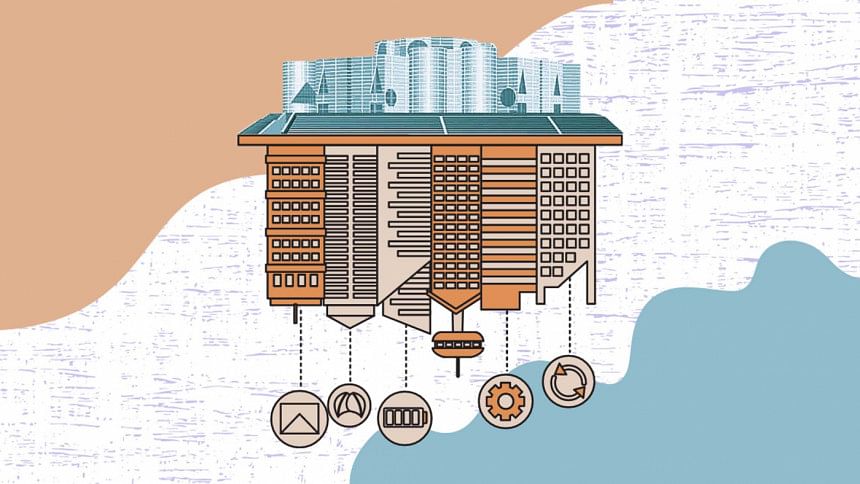A not-so-smart proposal for an offshore smart city

In an unprecedented move, the parliamentary standing committee on housing and public works ministry has directly recommended a major development project—to build an offshore smart city claiming land from the Bay of Bengal—directly to the prime minister.
The offshore smart city project involves the development of a seaside bayview smart city on a stretch of 60 square kilometres of land connecting Sagarika Point of the Patenga Beach with the Bangabandhu Shilpa Nagar in Mirsarai. A consortium of two local companies—The Peninsula Chittagong and Mazumder Enterprise—and two Chinese companies— China Civil Engineering Construction Corporation (CCECC) and China Railway Design Corporation (CRDC)—are pushing for the approval of this project. In return for stake in the smart city, the consortium has also proposed to build a 20.5-kilometre metro rail line in the port city, which would cost about USD 2.2 billion.
The move is being termed unprecedented because article 76 of the constitution does not include scope of such recommendations within the jurisdiction of parliamentary standing committees. However, section 248 of rules of procedure of the parliament states, "the functions of a Committee shall be to examine any Bill or other matter referred to it by Parliament, to review the works relating to a Ministry which falls within its jurisdiction, to inquire into any activity or irregularity and serious complaint in respect of the Ministry and to examine, if it deems fit, any such other matter as may fall within its jurisdiction and to make recommendations." It is this particular section that the said parliamentary committee has utilised to make the recommendation directly to the PM.
There is a debate on whether a parliamentary standing committee can directly and unilaterally make a recommendation to the prime minister for such a massive project. This is especially the case as it would potentially involve significant engagement and inputs from multiple ministries, including the Ministry of Foreign Affairs (since it deals with territorial implications), Ministry of Law (since legal advice on the way forward would be required, at both national and international levels), Ministry of Environment (since environmental impact assessments would be required), and the Ministry of Road Transport and Bridges (since the proposal includes construction of a metro rail line). But there are also many other inconsistencies in the narratives that have surfaced in a report published by this daily.
For one, while a memorandum of understanding signed between the Chattogram Development Authority (CDA) and the consortium was mentioned in the documents presented in the parliamentary standing committee meeting, when asked about it, CDA chief engineer, Kazi Hasan Bin Shams denied it, saying such an agreement would be signed "once the government gives the go-ahead." If that is the case, then why was it even mentioned? Was it a clerical error? Or has an MoU actually been signed which the authorities now are trying to keep under wraps?
Secondly, while chief of parliamentary standing committee on housing and public works ministry, Mosharraf Hossain—who also has a significant stake in The Peninsula Chittagong—is strongly pushing for the proposal and justifying his recommendation saying it's "a very good proposal," his son Mahboob-Ur-Rahman, also chairman of the same company, more tactfully suggested to this daily that they have partnered with two Chinese companies to assess feasibility of the project, which is "almost done."
However, the CDA chief engineer stated the contrary when asked about the feasibility study: "For that, they will need the government's permission."
If the feasibility study of the project is "almost done," then why is CDA not aware of it? And if the government's permission is indeed needed, then how could the consortium go ahead with the study? And who's paying for it?
Also, since the project is going to be based on land claimed from the sea, how is the CDA involved? Perhaps, because the parliamentary standing committee was too eager to materialise this proposal, they did not consider whether CDA was even eligible to place such a proposal to them. The CDA's jurisdiction is only limited to the existing land mass of the country, as per Section 6 of the Chattogram Development Authority Act-2018. As it is a new kind of project, involving land claimed from the Bay of Bengal, it needs to be understood, through legal advice, under whose purview this would fall.
A thorough discussion and evaluation of the proposal by the parliamentary standing committee could have also helped in understanding how the proposed metro rail line would affect the advanced-level ongoing discussion between road transport and bridges ministry and Korea International Cooperation Agency about the feasibility study to establish a mass rapid transit network in Chattogram. Also the role of the CDA in the building of the proposed metro rail line by the consortium needs to be assessed, since this ideally should fall under the jurisdiction of the road transport and bridges ministry.
The environment seems to have been the least considered aspect in the recommendation. When land will be claimed from the Bay of Bengal, how it would affect the overall ecology—especially marine life—needs to be taken seriously. And if such assessments have not been conducted before recommending the proposal to the PM directly, based on what information is the PM expected to make a call on it?
The issue of the consortium's share in the project demands detailed scrutiny. The public needs to know and, more importantly, the government and the PM need to know, what kind of share they are expecting from the sales of the structures in the smart city—and whether it would be feasible and profitable for the nation to allow such stakes. Surely, the consortium would not construct the metro rail line incurring a loss.
The conflict of interest involving the chief of the said parliamentary standing committee, along with that of Mazumder Enterprise—whose CEO, Mohammed Jashim Uddin Chowdhury, happens to be a ruling party sub-committee member on relief and social welfare since 2014—needs to be thoroughly investigated.
A project of this stature and scale needs thorough onboarding of all parties involved or of those whose involvement could be needed, along with buy-in from every single one of the stakeholders. One man calling it a "very good" proposal does not make it "very good" for everyone. It might be very good for certain individuals. But this is not the parameter by which to assess the greater benefits to the nation.
The authorities concerned should take this issue seriously and form a cross-ministerial and multisectoral stakeholder body to neutrally assess the proposal shared by CDA to the parliamentary standing committee, and take a holistic approach to decide whether to proceed with the proposal or not.
While we all want growth and prosperity of the nation, it should not come in a hasty package as a result of certain quarters' interests. We must set our priorities straight.
Tasneem Tayeb is a columnist for The Daily Star. Her Twitter handle is @tasneem_tayeb

 For all latest news, follow The Daily Star's Google News channel.
For all latest news, follow The Daily Star's Google News channel. 








Comments